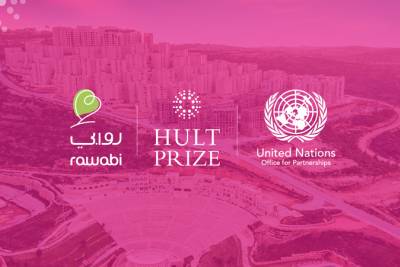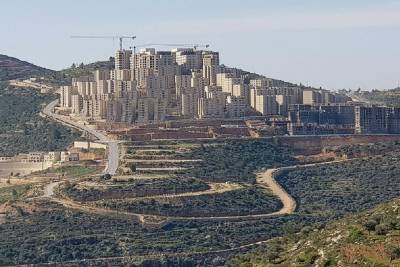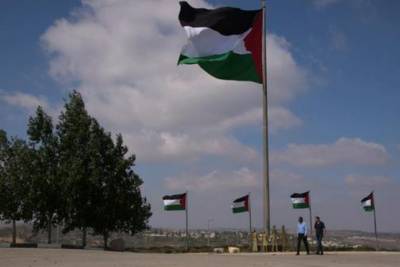Not waiting for statehood, Palestinians build cities
USA TODAY - Michele Chabin - RAWABI, West Bank — University professor Khansaa Diab faces the hassle of an Israeli military checkpoint twice a day once she moves in to her new apartment in Rawabi, the first Palestinian city to be built in decades.
But on a recent visit to the development, she was thinking more about which high-end tiles and fixtures to pick for her spacious, upscale home than the commute from her job in Jerusalem.
"I heard about Rawabi from friends and I fell in love with the landscape and the fresh air," she said in the developer's ultra-modern showroom, where multistory buildings surrounded by mountains were under construction. "Everything is really high-class."
A woman of Palestinian heritage born in Israel and living in Jerusalem, Diab sees Rawabi as an example of what Palestinians can do if they focus on the future.
"This is our project based on our industries, using our materials," she says. "I will live here with a lot of pride."
Negotiations for a Palestinian state broke down last month between the Palestinian Authority and Israel, which demands that the Palestinian leaders recognize the Jewish state before it agrees to end its objections to a Palestinian one.
Yet that is not stopping some Palestinians from moving ahead with modernization.
Rawabi is one of several residential projects being built in the West Bank, which for the past few years has experienced a building boom after decades of little development.
The demand for new homes is high, due largely to the West Bank's relatively high birth rate, an expanding middle class and a land shortage. And many Palestinians who could not afford to buy a new home now can with the help of cut-rate mortgages via a $313 million loan from the U.S. government's Overseas Private Investment Corporation provided to the Palestinian Authority.
Bashar al-Masri, the Palestinian multimillionaire who is developing Rawabi in partnership with the Qatari company LDR, believes the city, which will ultimately create 40,000 dwellings, is an expression of Palestinian aspirations for a state and a normal life.
"It says a lot about what the Palestinian people would like their state to be like. We're building a nice, modern, secular city with mosques and churches," he says.
The construction is providing employment to thousands of Palestinians, many of whom lost their jobs in Israel during the second Palestinian uprising.
Built in ever-widening circles, the city bears a striking resemblance to the West Bank's larger Jewish settlements. The innermost circle, which consists of 650 apartments in dozens of buildings, a shopping center, schools, places of worship and a clinic, should be completed by year's end. There will also be a sports field, outdoor amphitheater, hotel, convention center and spa.
Wherever possible, the developers are using local materials. Everything from the quarrying and cutting of stones to the testing of building materials is done on site.
Driving around the city, Jack Nasser, Rawabi's manager of logistics, said the developers have sold the first 650 units. Although there has been "high interest" from investors, including many Palestinian expatriates, this first neighborhood will include mostly full-time residents "to build a sense of community and not create a ghost town."
Nasser, who purchased a spacious apartment in Rawabi, said the city is a way "to build our nation. We are proof you can enjoy a high quality of life here, despite the Israeli occupation."
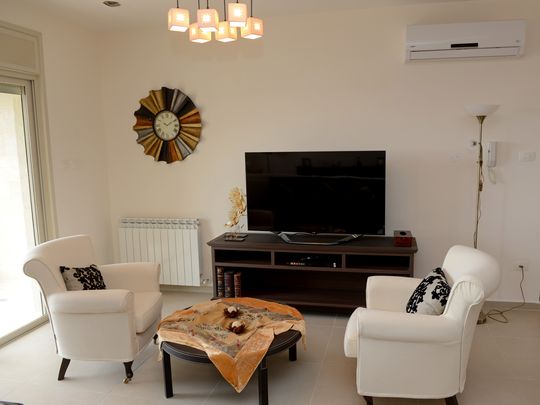
A model apartment in the Palestinian planned community of tomorrow.
West Bank residents say the building boom has not eliminated fundamental problems with the economy, however. The GDP on the West Bank has been growing for years but slowed in 2013 due in part do a drop-off in foreign aid, according to the World Bank.
Giving Palestinians access to mortgages "doesn't mean the economy is flourishing," emphasized Sam Bahour, an American-born Palestinian business consultant based in the West Bank.
Although Rawabi is being built on land controlled completely by the Palestinian Authority, some of its infrastructure crosses a few miles of Israel-controlled territory. And that has created challenges, Nasser said.
Lior Amihai, who monitors Jewish settlement building for Peace Now, an Israeli anti-settlement organization, said it took years for Israeli authorities to grant permission to pave the only road, currently just one lane each way, to Rawabi.
Until then, "huge trucks had to go through tiny Palestinian roads crossing through small villages," Amihai said.
The developers charge that Israeli bureaucracy has failed to link Rawabi to the water grid, making it impossible for the first residents to move in. A glossy Rawabi brochure notes that the water line has yet to be approved by the Israeli-Palestinian Joint Water Committee.
"People are worried about the lack of progress on the political level. We thought these issues would be solved years ago," Masri admitted.
But a statement by Israel's Coordinator of Government Activities in the Territories said that Rawabi is located entirely in areas under the responsibility of the Palestinian Authority, including the water supply of the city.
"At the present time there is no possibility of approving and advancing new water projects, because of the Palestinian refusal to hold meetings of the Joint Water Committee (JWC) that was established, among other things, to approve mutually projects which involve the two populations" the statement said.
"Despite this, the coordinator of Government Activities in the Territories is trying to reach solutions for arranging this issue."
On the issue of the access road, "the arranging of a permanent permit for the city is now in advanced stages. For allowing the movement to the city, a temporary access road was approved few months ago."
But some Palestinians think Rawabi's developers are creating a gilded cage of sorts, and creating the impression that Palestinians don't need a state of their own, given the good life they can enjoy without sovereignty.
Bahour disagrees.
"There are those who say we should wait until the Israeli occupation ends, or that we should end the occupation through violence. "To me, those are both devastating options."
The way Bahour sees it, "we are creating a positive present and future. If we go to a nice supermarket or live in a nice home, it's an indication of Palestinian resilience, of our determination to seek out normalcy in an abnormal situation. It is that non-violent resistance and resilience," he insisted, "that will end the occupation."
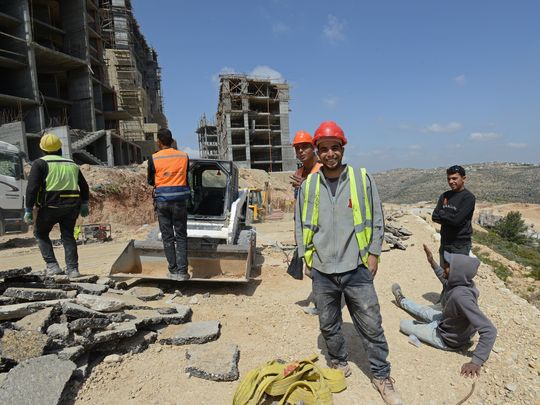
Palestinian workers take a break in Rawabi.
To view original article, Click Here.

